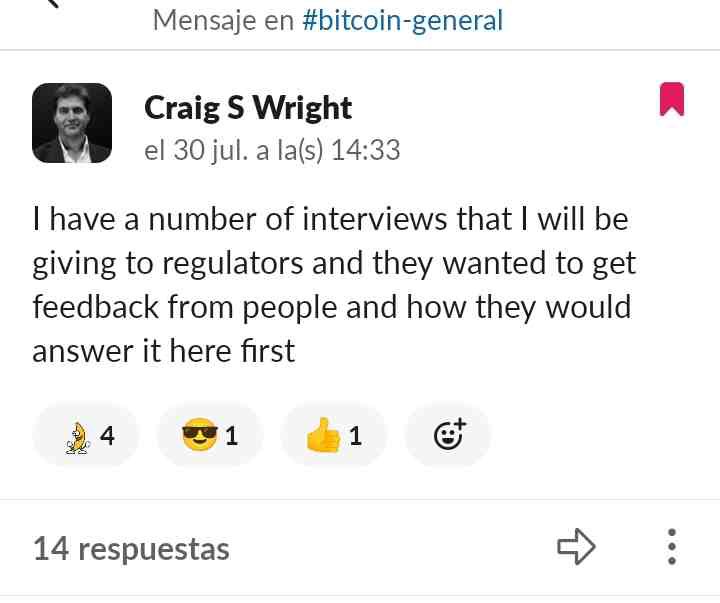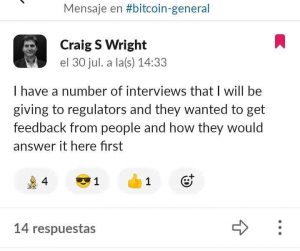CSW Bitcoin Survey Q&A (Encuesta)
CSW Bitcoin Survey Q&A (Encuesta)
2022 08 10
CSW
Jul 30, 2022
https://metanet-icu.slack.com/archives/C5131HKFX/p1659184389931109?thread_ts=1659184389.931109&cid=C5131HKFX
I have a number of interviews that I will be giving to regulators and they wanted to get feedback from people and how they would answer it here first
Tengo una serie de entrevistas que daré a los reguladores y querían obtener comentarios de las personas y cómo responderían aquí primero.

¿Puede describir lo que cree que es Bitcoin y cómo funciona Blockchain?
Bitcoin es un sistema electrónico de efectivo peer to peer. Permite la transferencia de tokens electrónicos directamente de una parte a otra mediante la creación y » firma” de una transacción digital. El remitente puede enviar esta transacción al destinatario. Luego, el destinatario puede verificar que la transacción sea válida y reenviarla a los mineros para que la incluyan en la cadena de bloques. La cadena de bloques es un registro del historial de transacciones que está asegurado por los incentivos financieros a los que están sujetos los mineros y que obliga a una acción honesta debido a que es más rentable que intentar hacer trampa. No menos importante, porque intentar engañar al sistema dejaría un rastro forense que tendría repercusiones legales.
¿Puede decirme qué significa su comprensión de la descentralización y qué requisitos deben cumplirse para considerar un sistema descentralizado?
La descentralización es la noción de que un sistema no está controlado en su totalidad por una sola autoridad. Cuando un sistema depende de más de una parte independiente para operar, esto puede considerarse descentralizado. Existe la idea errónea de que más partidos siempre conducen a una mayor descentralización, pero la realidad es que hay pocos beneficios en aumentar el número.
¿Puede explicar la diferencia entre un sistema encriptado y oscurecido y cómo Blockchain usa la tecnología criptográfica?
Los datos cifrados generalmente requieren que se conozca algún tipo de secreto para poder inspeccionar (o descifrar) los datos. La ofuscación es donde los datos no están encriptados pero son difíciles de analizar. Esto podría deberse, por ejemplo, a la gran cantidad de datos sin identificadores significativos. La cadena de bloques en sí no está encriptada, es un registro de texto sin formato de toda la actividad registrada por los mineros en los » bloques » que se han extraído. La criptografía solo es utilizada por los participantes en el sistema cuando crean transacciones. Esto sucede porque un tx válido generalmente requiere una firma válida, la firma se crea mediante el uso de una clave privada, que solo debe conocer la persona que posee/controla el bitcoin para una clave pública determinada. Las claves públicas son, como sugiere su nombre, conocidas públicamente. Es posible verificar una transacción verificando que la firma corresponda a la clave pública. De esta forma, cualquiera puede validar transacciones.
¿Cómo se puede distribuir un sistema para que quede fuera del alcance del control regulatorio? ¿Cuántos sistemas se requerirían y cuál es la diferencia, en su opinión, entre un grupo de desarrolladores y la asociación que opera en diferentes lugares?
Podría ser posible diseñar un sistema que cifre los datos de modo que los reguladores no puedan observar lo que está ocurriendo. Al distribuir esto entre múltiples jurisdicciones, sería difícil para los reguladores monitorear y, por lo tanto, regular dicho sistema. Sin embargo, los reguladores probablemente podrían usar las regulaciones KYC/AML existentes para considerar que dicho sistema es ilegal y comenzar operaciones para intentar cerrar o inhibir dicho sistema. Un mecanismo para inhibir o incluso prevenir por completo el funcionamiento de dicho sistema sería apuntar a los desarrolladores de dichos sistemas, ya que serían los responsables de la provisión. (Otra vía sería apuntar a los mineros, siempre que fuera un sistema basado en blockchain). No estoy seguro de que la ubicación geográfica de los desarrolladores tenga tanta influencia en la responsabilidad y los reguladores probablemente podrían apoyarse en acuerdos internacionales con respecto a la extradición de personas que se considera que cometieron actividades delictivas. Si bien es posible que estas medidas no proporcionen una regulación perfecta o garanticen la no operación de dichos sistemas destinados a frustrar a los reguladores, son suficientes para crear suficiente fricción como para interrumpir gravemente las operaciones.
¿Qué responsabilidades cree que se pueden implementar contra el creador de un sistema de efectivo digital si no implementa los controles legales requeridos?
Es probable que estén sujetos a repercusiones legales en torno al fraude. Esto podría dar lugar a una orden judicial de cumplimiento a un proceso penal por no hacerlo.
¿Cuál es su comprensión de las acciones legales emprendidas contra proveedores peer-to-peer, incluidos Grokster y Limewire, en el pasado?
No estoy al tanto de los detalles, pero entiendo que se tomaron acciones legales para » cerrar» estos servicios. Esperaría que esto resultara en la incautación/decomiso de activos y probablemente cargos penales contra aquellos identificados como responsables de la prestación de los servicios.
* ¿A quién entiendes para controlar el sistema, como un Blockchain como el núcleo BTC?
Los desarrolladores principales son los principales responsables del control del núcleo BTC. Hay una serie de eventos históricos que muestran claramente esto: cambios de protocolo que han sido acordados e implementados por dichos desarrolladores principales que los mineros de BTC se han visto obligados a implementar para no perder su inversión de capital en infraestructura minera. Hay muchos ejemplos registrados públicamente de estos desarrolladores que toman decisiones que cambian el protocolo BTC. Estas son una clara indicación de que son responsables de BTC Blockchain y del sistema construido sobre ella.
Si pudiera implementar cualquier cambio para ayudar en el control de la aplicación de las reglas de efectivo digital, qué haría?
Creo que la ley existente es, en general, suficiente para regular el dinero digital. Creo que las reglas, al menos para Bitcoin, se explicaron en el libro blanco y que son y no necesitan cambios. Las partes internas de Bitcoin contienen un lenguaje de script de propósito general que permite todo tipo de invenciones o nuevos tipos de transacciones, sin cambiar el protocolo fundamental. Creo que los controles se aplican automáticamente como resultado del mecanismo de incentivos. Los malos actores que no cumplen con las reglas son condenados al ostracismo y sufren pérdidas financieras. Los buenos actores tienen incentivos para aislar a los malos porque tienen un incentivo financiero para hacerlo. No solo materialmente por el aumento de los ingresos, sino perceptivamente, ya que los usuarios finales ven que los buenos actores protegen el sistema de los malos actores.
* ¿Por qué implementaría tal control?
N/A no se necesita control adicional en mi opinión
Si no cree que sea posible, ¿ por qué cree que esto no sería factible de lograr?
No creo que sea necesario que una agencia externa haga cumplir las reglas del efectivo digital. Sin embargo, si las reglas que se aplican se consideraran ilegales, supongo que las autoridades podrían obligar a los mineros/usuarios a implementar reglas diferentes. Suponiendo que las reglas del efectivo digital se refieran al protocolo, entonces no lo veo tan probable, ya que el protocolo en sí simplemente describe el mecanismo por el cual los participantes comunican los datos, y lo hace de una manera que permite el monitoreo (y como tal). regulación) por las autoridades necesarias.
* La última oración del Libro Blanco de Bitcoin (CS Wright, 2008) señaló que los nodos podrían hacer cumplir las reglas necesarias. ¿Qué cree que significa esto para usted como organismo regulador?
No soy un organismo regulador, pero si lo fuera, consideraría que esto significa la aplicación del protocolo de manera que sea coherente. Que los mineros sean portadores neutrales de datos que cumplan con dicho protocolo, y que la regulación se dé en el nivel superior en cómo las personas usan el protocolo. Por ejemplo, cuando el protocolo se utilice para brindar servicios análogos a los servicios financieros tradicionales, esos servicios deben regularse de manera similar.
¿Qué planes tiene con respecto a la implementación de sistemas basados en Blockchain o moneda digital del banco central en su jurisdicción?
Como proveedor de servicios de software, todavía estamos considerando la forma en que puede ser útil aprovechar esta tecnología con el fin de realizar registros de auditoría confiables; sin embargo, no tenemos planes concretos para implementar sistemas basados en Blockchain en este momento.

CSW Bitcoin Survey Q&A
CSW
Jul 30, 2022
https://metanet-icu.slack.com/archives/C5131HKFX/p1659184389931109?thread_ts=1659184389.931109&cid=C5131HKFX
Can you describe what you believe bitcoin to be and how Blockchain functions?
Bitcoin is an electronic peer to peer cash system. It allows for the transfer of electronic tokens directly from one party to another by way of the creation and ‘signing’ of a digital transatction. The sender can send this transaction to the recipient. The recipient can then verify that the transaction is valid, and forward it to miners for inclusion in the blockchain. The blockchain is a record of transaction history that is secured by the financial incentives that miners are subject to that compels honest action due to it being more profitable than attempting to cheat. Not least, because attempting to cheat the system would leave a forensic trail that would result in legal repercussions.
Can you tell me what your understanding of decentralisation means and what requirements need to be in place for you to consider a system to be decentralised?
Decentralisation is the notion that a system is not controlled entirely by a single authority. Where a system relies on more than one independent party to operate this can be considered decentralised. There is a misconception that more parties always leads to more decentralisation, but the reality is that there is little benefit in increasing numbers.
Can you explain the difference between an encrypted and obscured system and how Blockchain uses cryptographic technology?
Encrypted data typically requires that some kind of secret is know in order to be able to inspect (or unencrypt) data. Obfuscation is where data is not encrypted but it is difficult to analyse. This could be for example because of the large quantity of data with no meaningful identifiers. The blockchain itself is not encrypted, it is a plaintext record of all activity that has been recorded by miners in the ‘blocks’ that have been mined. Cryptography is only used by participant in the system when they create transactions. This happens because a valid tx typically requires a valid signature, the signature is created by using a private key, that should only be know to the person that owns/controls the bitcoin for a given public key. Public keys are, as the name suggests, publicly known. It is possible to verify a transaction by checking that the signature corresponds to the public key. In this fashion it is possible for anyone to validate transactions.
How can a system be distributed so that it would be outside the reach of regulatory control? How many systems would be required, and what is the difference in your opinion between a group of developers and the partnership operating in different locations?
It might be possible to design a system that encrypts data such that regulators could not observe what was taking place. By distributing this across multiple jurisdictions then it would be difficult for regulators to monitor and thus regulate such a system. However, regulators could likely use existing KYC/AML regulations to deem that such a system was illegal and commence operations to attempt to shut down or inhibit such a system. One mechanism to inhibit or even fully prevent operation of such a system would be to target the developers of such systems, as they would be the ones respsonbile for provision. (Another avenue would be targeting the miners – provided that it was a blockchain based system). I am not sure the geographical location of developers has such bearing on responsibility and regulators could likely lean on international agreements regarding the extradition of people’s who were deemed to be committing criminal activity. Whilst these measures may not provide perfect regulation, or guarantee the non-operation of such systems intended to thwart regulators, they are sufficient that they would create enough friction as to severely disrupt operations.
What liabilities do you believe can be implemented against the creator of a digital cash system if they fail to implement the required legal controls?
They would likely be subject to legal repercussions around fraud. This could result in a court order to comply, and or criminal prosecution for failure to do so.
What is your understanding of legal actions taken against peer-to-peer providers, including Grokster and Limewire, in the past?
I am not aware of the specifics, but I understand legal actions were taken on order to “shut down” these services. I would expect this resulted in seizure/forfeiture of assets and probably criminal charges against those identified as being responsible for delivery of the services.
* Who do you understand to control the system such as a Blockchain like BTC core?
The core developers are chiefly responsible for control of BTC core. There are a number of historical events that clearly show this – protocol changes that have been agreed upon and implemented by said core developers that BTC miners have been compelled to implement in order to not lose their capital investment in mining infrastructure. There are many examples on record publicly of these developers making decisions that change the BTC protocol. These are a clear indication that they are responsible for the BTC Blockchain and the system built upon it.
If you could implement any changes to aid in the control of enforcement of digital cash rules, what would you do?
I think that existing law is by and large sufficient to regulate digital cash. I think the rules – for Bitcoin at least – were explained in the white paper and that they are and do not need changing. The internals of Bitcoin contain a general purpose script language that allows for all manner of inventions o new transactions types, without every changing the fundamental protocol. I think the controls are self enforcing as a result to the incentive mechanism. Bad actors that do not comply with the rules are ostracised and suffer financial loss. Good actors are incentivised to ostracise bad actors because they have a financial incentive to do so. Not just materially from increased revenue, but perceptually as end users see that good actors are securing the system from bad actors.
* Why would you implement such a control?
N/A no additional control is needed in my opinion
If you don’t believe it’s possible, why do you think this would not be feasible to achieve?
I don’t think it is necessary for external agency to enforce digital cash rules. However if the rules being enforced were deemed illegal then I suppose it could be possible for authorities to compel miners/users to implement different rules. Assuming that the digital cash rules are referring to the protocol then I do not see this as likely, as the protocol itself merely describes the mechanism by which data is communicated by participants, and does so in a fashion that allows for monitoring (and as such regulation) by the necessary authorities.
* The last sentence of the Bitcoin White Paper (C. S. Wright, 2008) noted that the nodes could enforce any necessary rules. What do you believe this means to you as a regulatory body?
I am not a regulatory body, but if I was then I would take this to mean enforcement of the protocol such that it is consistent. That miners are neutral carriers of data that complies with said protocol, and that regulation takes place at the level above in how people use the protocol. For example where the protocol is used to provide services analogous to traditional financial service, those services should be regulated similarly.
What plans do you have concerning implementing Blockchain-based systems or central-bank digital currency in your jurisdiction?
As a software service provider we are still considering way in which it may be useful to leverage this technology for the purpose of reliable audit trails, however we have no concrete plans to implement Blockchain based systems at this present time.




Dejar un comentario
¿Quieres unirte a la conversación?Siéntete libre de contribuir!